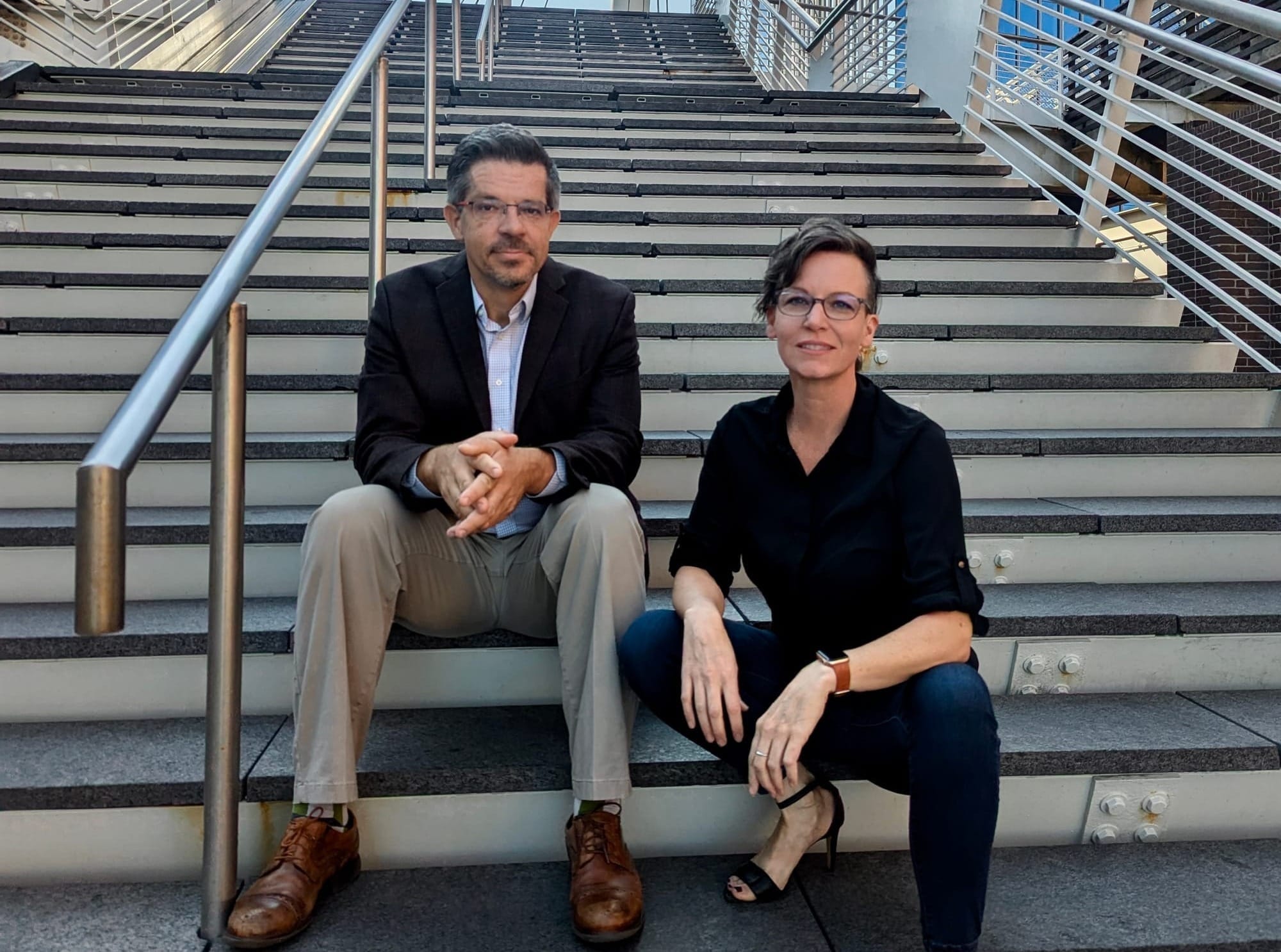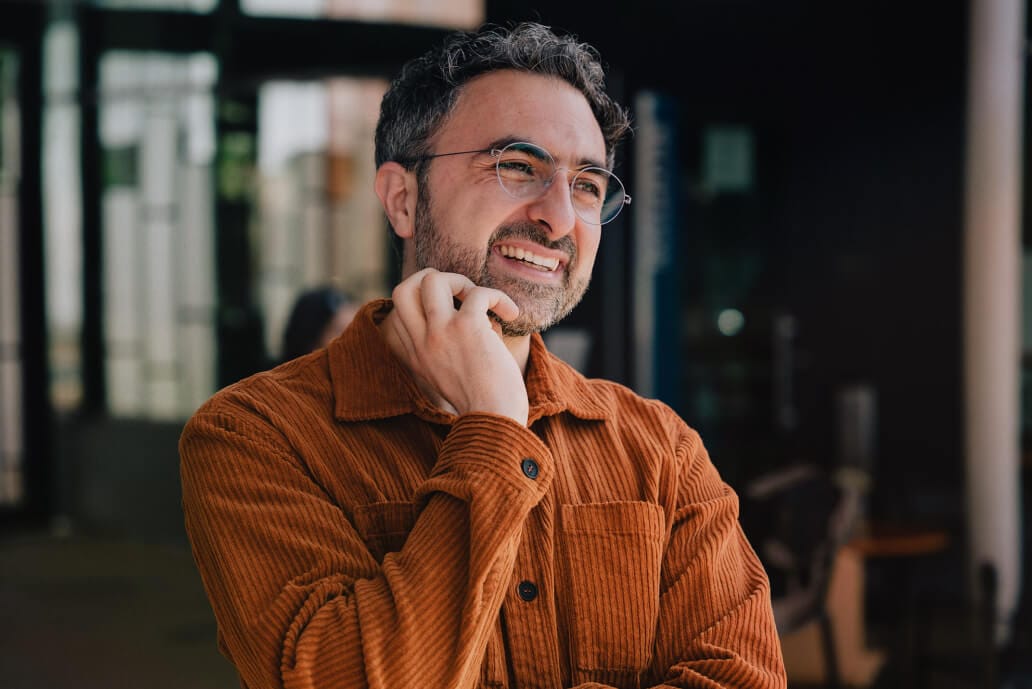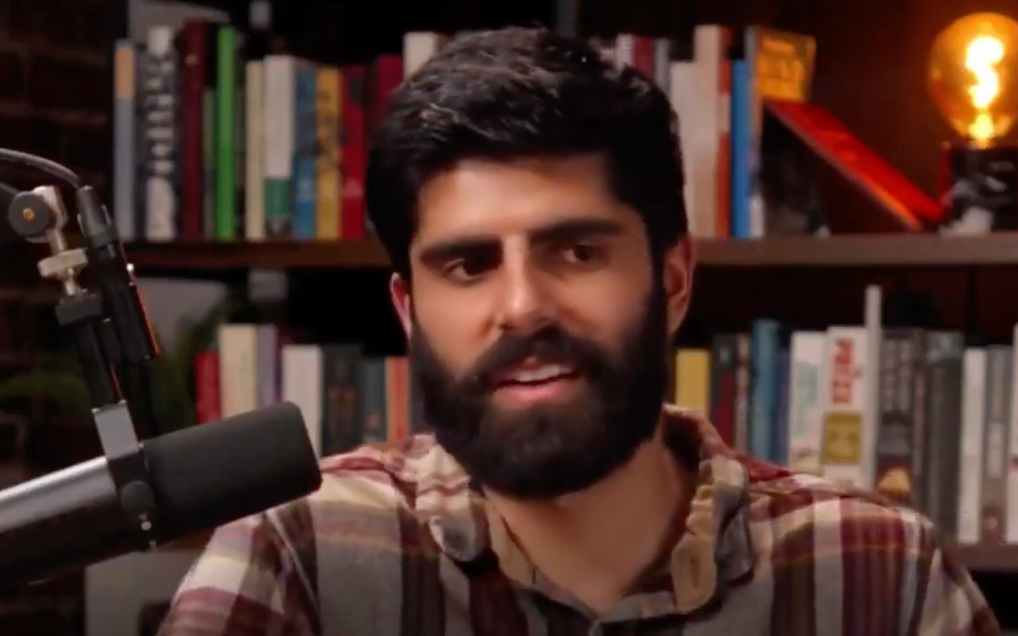The Big Picture
According to the National Institutes of Health, more than 10 million Americans experience some form of domestic or family violence every year. Additionally, victims of domestic abuse tend to exhibit prolonged changes in stress response biomarkers, and many victims experience lasting psychological effects of trauma.
With all this in mind, in the late summer of 2023, Denverites Anne Wintemute and Steven Nichols began working on creating the AI app ‘Aimee Says.’ This innovative tool helps victims of domestic abuse process what’s been happening to them by providing users with valuable context and advice for dealing with what can be extremely challenging and long-lasting situations.
Wintemute, CEO of the firm, reveals that Aimee Says is engineered to provide comprehensive support, from recognition to recovery. “She can help victims identify and understand the most subtle of controlling behaviors, she provides validating companionship, and she supports taking action in numerous ways, from filing for protection orders to preparing evidence for family court proceedings.”
The app has been adding subscribers at a remarkably rapid rate since it launched, averaging more than 50% monthly. By now, over 30,000 people have used Aimee Says, not just throughout the U.S., but also in Canada, New Zealand, across Europe, and even in India.
Summing up Aimee Says in just a few words, Wintemute states that the app ensures a victim’s story is not only told, but that it’s told with confidence, comprehensiveness, and confidentiality.
The Societal Problem
It’s well known by now that survivors of domestic violence — including those who have escaped the abusive situation — are at greatly increased risk for being diagnosed with PTSD, an anxiety disorder, or a major depressive disorder, and they are at greatly increased risk for self-harm, suicidal ideation, suicide, and substance use disorders.
Wintemute says, “One of the most damaging aspects of abuse is that perpetrators are highly skilled at getting their partner to doubt their perceptions of reality. The number one thing we hear from people who have talked to Aimee is that they feel less ‘crazy.’ Victims know the truth, but they doubt their credibility as a witness to their experience. Aimee changes that.”
Not only does the app work to “clear the fog of dissonance,” but Wintemute goes on to say that it helps to open doors for justice, safety and healing. ”It looks different depending on the goals of the survivor, but Aimee has helped family members see the abuse, attorneys file to protect children, law enforcement understand the pattern of coercive control, and custody evaluators see that perpetrators are adept at perception management while concealing abusive behaviors.”
An AI-Driven Confidante
Aimee Says can help domestic violence victims advocate for themselves in many different ways, including:
· Describing victims’ experiences, by guiding them through the process of narrating their story and breaking down complex emotions and events into manageable parts
· Connecting their stories to the law, by linking what they’ve experienced to legal definitions of abuse and specific, relevant statutes
· Helping them craft victim statements, making sure that they are comprehensive and emotionally resonant
· Presenting evidence, such as text messages, emails, and witness testimony, and helping victims understand how to most effectively reference them
· Providing guidance on the importance of certain details and offering alternative phrasing when a victim finds it difficult to describe a particular event or emotion
Aimee Says also is able to help victims of post-separation abuse, which Wintemute defines as continued attempts to maintain control over the victim. Such actions may take the form of harassment, stalking, or other attempts to undermine the victim’s independence.
In these situations, Aimee Says can help the victim recognize signs and identify patterns of ongoing abuse, examine the issue of legal abuse (maintaining control through the court system), and deal with the many challenges of co-parenting abuse, which can include undermining the victim’s authority, manipulating the children, or using custody arrangements to disrupt the victim’s life.
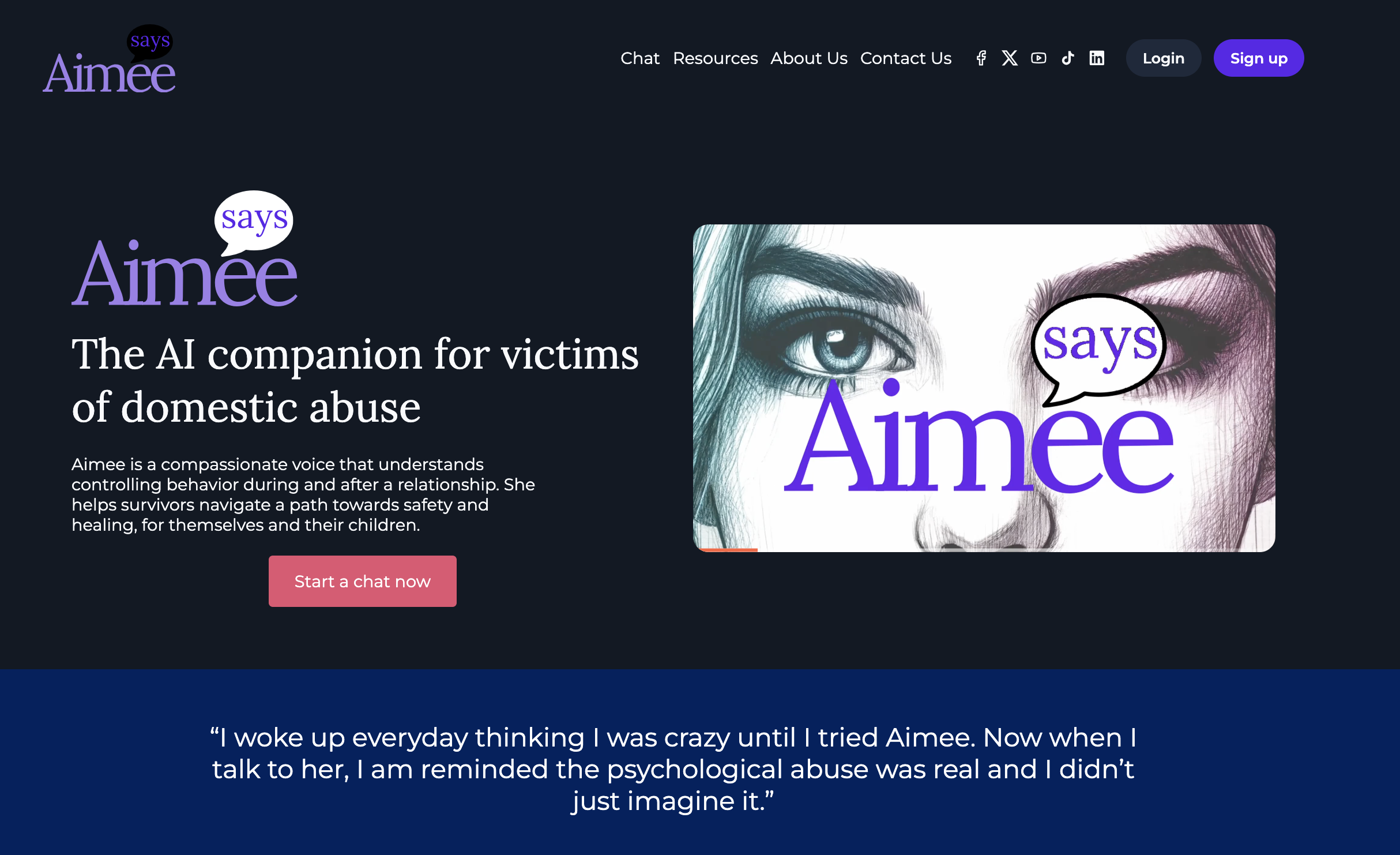
A Supplement, Not a Replacement
Nichols, the firm’s chief strategy officer, is quick to express that Aimee Says is not trying to replace attorneys, therapists, or any other professionals. “There’s no intention of Aimee Says being a replacement for anyone. It’s much more that Aimee can be a supplement to all the professionals out there.”
He goes on to note that in order to help Aimee Says find the right balance between the professionals and the app, the company has a board of advisors that boasts a licensed mental health professional, a law enforcement officer, two public policy professionals, and two attorneys.
Wintemute adds, “When you consider how most people, if they’re lucky enough to be able to have a therapist, would typically talk to them just once a week for an hour – well, what about all the rest of the hours in a week? The reality is that people need support in a moment-to-moment basis, and especially people who’ve been through a traumatic event like this – or who are still going through it.”
Perhaps it might be useful to think of Aimee Says as a thoughtful, intelligent, logical, and well-organized best friend who’s able to provide clear-headed thinking and a steel-trap memory in times of uncertainty and crisis.
And yet, because many victims of domestic violence won’t share what they’re going through with anyone – not even with their best friends – Aimee Says is able to provide a valuable option for both emotional support and taking action. Not to mention that our human friends cannot always be relied upon to offer sound logic, failproof memories, and instant recall in the best of times, let alone 24 hours a day, seven days a week.
In fact, when one steps back to examine what generative AI typically does really well, it’s sifting through unstructured data and reporting back on patterns and trends that it discovers. This can be especially helpful to victims of domestic abuse who may struggle to see those patterns and trends themselves.
Alleviating Privacy Concerns
One of the initial apprehensions of some who hear about Aimee Says is whether it safeguards privacy. While that’s important for just about any app, it’s absolutely critical for one asking users to share their most personal information related to domestic violence.
Aimee Says offers a free option as well as a subscription model, and Nichols states that the free version doesn’t save any user information on the site, meaning that when the browser window is closed, all of the communications instantly disappear. On the other hand, he indicates that the paid subscription, which allows users to upload documents and save chats and journal entries, adheres to the best practices of cybersecurity and ensures users confidentiality.
Further, Nichols makes clear that Aimee Says doesn’t train its model on user inputs or data, instead relying on a RAG (Retrieval-Augmented Generation) pipeline, which serves to preserve user privacy and mitigate any LLM hallucinations.
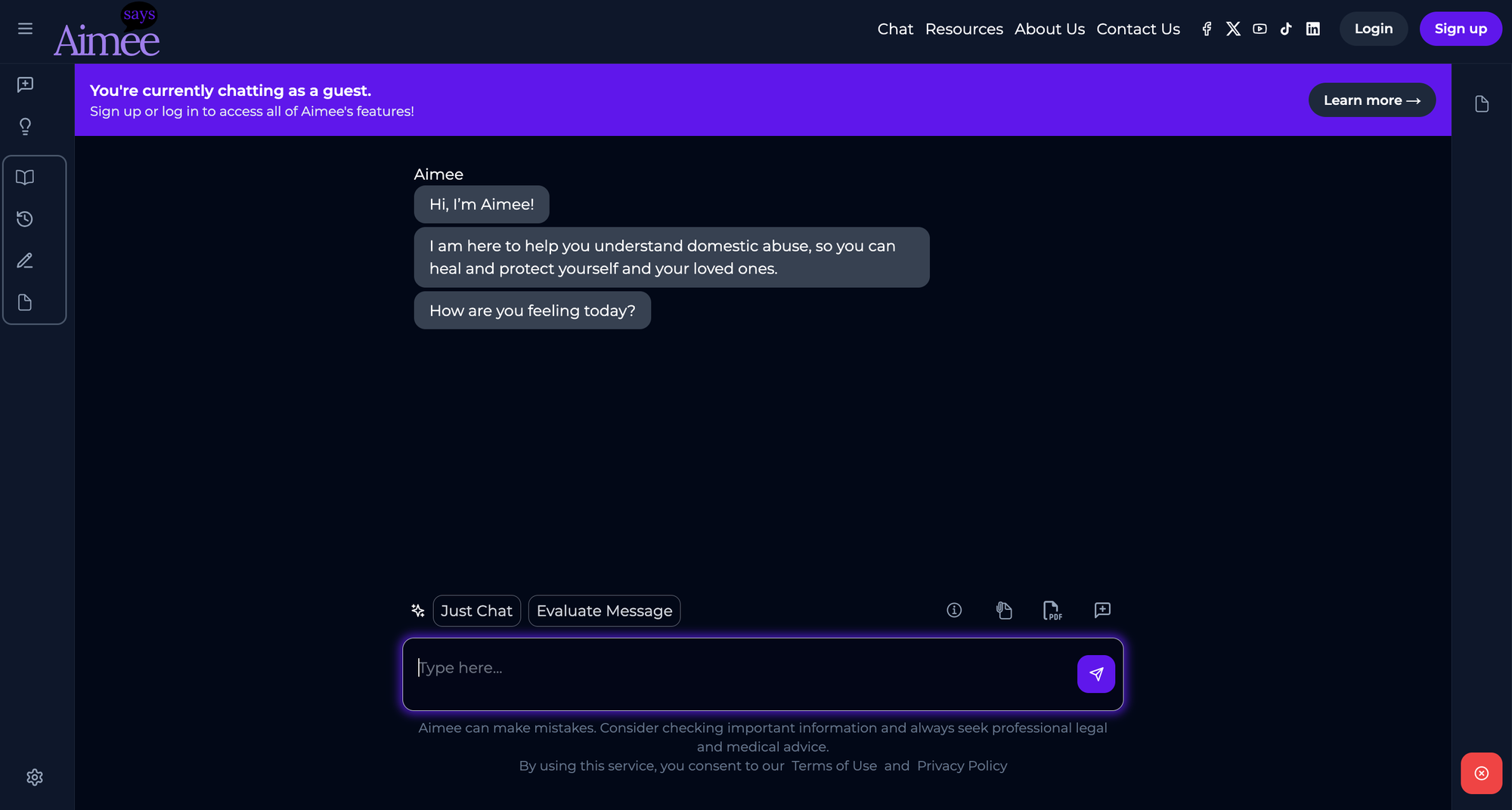
The Greater Meaning
Wintemute talked about how, at its core, domestic violence is really a pattern of control, and that many people don’t recognize that they’re in an abusive relationship until they’ve had a conversation with a professional. And yet, what Aimee Says offers is the chance for more victims to recognize the truth of their relationship much sooner than they otherwise would have.
Which, to both Wintemute and Nichols, is huge validation of what they’re doing. To that point, Wintemute said, “Overall, Aimee Says is promoting the agency and decision-making of the individual. One of the real harms that society does to victims and survivors is to make the presumption that because they ended up in this situation, they are not qualified to make decisions for themselves about what their best options are going forward. And it just feels incredible to us that we’re able to help these victims and survivors build back that agency.”
Nichols affirmed how meaningful working on Aimee Says has been for him personally, saying, “This is the most important work I’ll do in my lifetime. This is my moonshot; this is my Apollo 11.”
Looking Ahead
Aimee Says has already partnered with dozens of community-based organizations and programs in Colorado, across the U.S., and in the U.K. to help them expand victim services without increasing program costs. Wintemute adds that “given the significant cuts in federal funding anticipated for many of these organizations next year, there’s a mandate to leverage technology to mitigate the impact.”
Additionally, in Wyoming, the company has partnered with Crook County Family Violence and Sexual Assault Services to pilot AimeePOP. This is an embeddable Aimee chat bot that can support victims in utilizing existing services, and which will be able to provide ongoing support after the program engagement comes to an end.
Nichols cites the company’s continued growth and the fact that it’s currently profitable as laying a strong foundation for him and Wintemute to pursue a seed round. “Now that Aimee Says has validated the market and become profitable with growing ARR [annual recurring revenue], we are seeking angel and seed investors in order to scale up to meet the extraordinary level of need that we’re seeing.”
Asked for her closing thoughts, Wintemute says, “Our goal for Aimee is to be there when a human can’t, when a victim isn’t ready to reach out, or when the expense of services is prohibitive. The path to justice has always been paved by survivors.”


